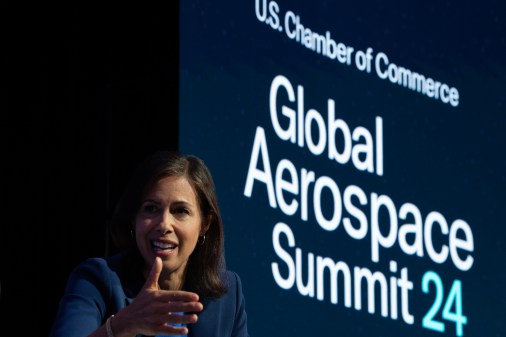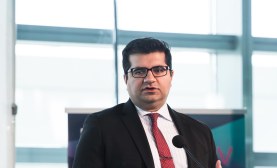CIOs urge the public to innovate where government can’t
It’s increasingly difficult for chief information officers in the federal government to innovate, stifled by a 240-year-old bureaucratic system. But a few CIOs have an idea for getting around that.
The American people.
During Fosterly’s Collaborate event Friday in Washington, D.C., General Services Administration CIO Sonny Hashmi and Federal Communications Commission CIO David Bray had several ideas for helping the government innovate, like establishing public-private partnerships and making the CIOs more than “glorified contracting officers.” But giving the American people the opportunity to crowdsource that innovation resonated most with the audience.
Already, some agencies have tested the waters of tapping the public for research and innovative projects.
The FCC had great success with an open-source broadband and wireless speed test app that depended on American citizens to download it and test their speeds. Without public participation, the app would’ve failed.
“I think that shows the public is hungry for things they can do that traditionally government has had to do,” Bray said. “I think that’s a challenge for innovation. What can we give back to the public that in the past, because we didn’t have connectivity or the systems we have, we can now actually let citizens choose to be a part by their own consent?”
The open data movement is a major component of this system, letting the public determine what they need from government rather than getting something government thinks they need.
Bray pointed to Challenge.gov, an online repository of contests that address obstacles faced by agences, as a great tool to drive this movement.
“The world we’re going into is no one person has the right answer. If this nation is ‘We the People,’ let’s turn it back to ‘We the People,'” he said. “[With] what sort of legal hacks, combined with technology hacks, can we give back responsibilities to the public for those who want to do it?”
But we’re still in the early stages of a major opening of government, Hashmi said, and it’s going to take some time before we fully reap the benefits.
“Government is a gigantic beast. Culture change in government takes a long time,” he said. “We’re still in the 1.0 [version] of this journey.”
Despite some initial successes with reaching out to the public, Hashmi and Bray still bemoaned a system that impeded their ability to try new ideas. Given the speed at which Silicon Valley and the private sector can innovate, the federal government is at risk of being left even farther behind, Hashmi said.
“In Silicon Valley, you’re rewarded for failing fast because the world is changing and there is no manual, and that’s OK, that’s the only way you can figure it out,” Bray said. “But yet public sector, again because we have to be good stewards, you fail once — sorry it’s over.”
He added, “[W]e lament the system that is doing exactly what it was designed to do: be stable, be good stewards, don’t change that much. Yet the environment we’re in is everything but.”






